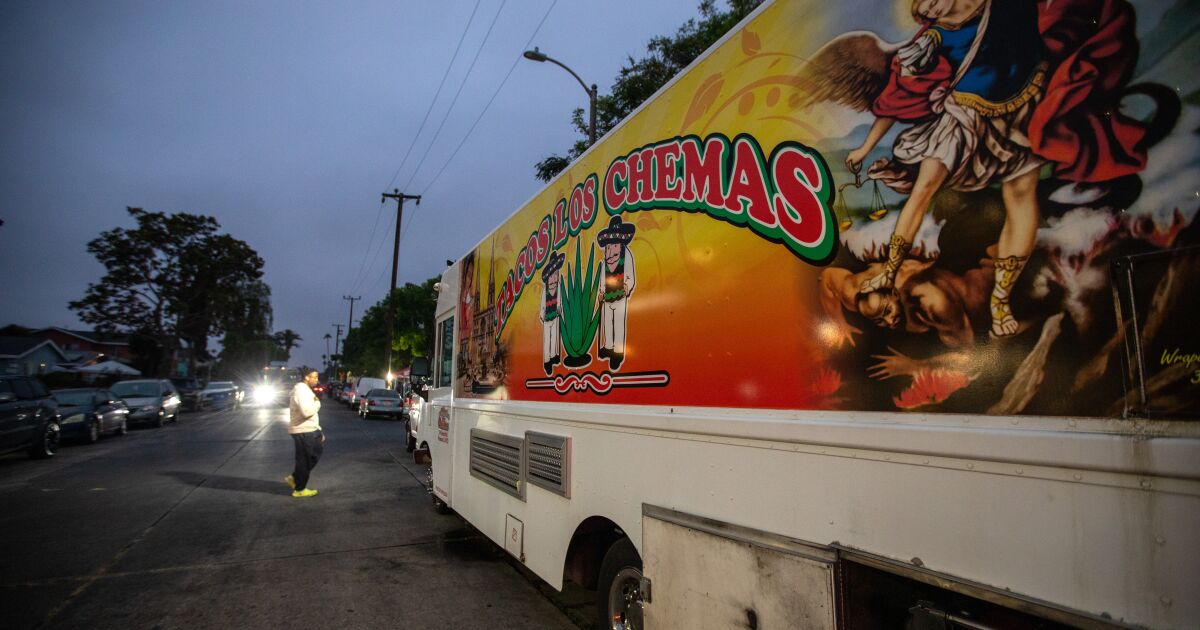Business
Gunmen rob five L.A. taco trucks and stands, the latest in a string of street holdups

Three gunmen robbed at least five taco trucks and street stands on Wednesday, the latest in a string of more than a dozen such holdups across Los Angeles, police said.
Waving guns in the faces of taco vendors, the three gunmen stole cash and cellphones, striking as the businesses were closing up for the evening in communities in Hollywood, Echo Park and downtown Los Angeles, according to the Los Angeles Police Department.
LAPD investigators said the spate of robberies began at about 9:40 p.m. in the area near 3rd and Bixel streets. Then five minutes later, the same suspects targeted a taco stand at Union Avenue and Shatto Street in the Westlake area before fleeing in a getaway vehicle described as a white Honda. Then at about 11 p.m., the taco stand at 5936 Santa Monica Blvd. in Hollywood was robbed.
Ten minutes later, another taco truck at Alvarado Street and Glendale Boulevard was robbed by armed bandits. The string of robberies concluded about 11:30 p.m. when gunmen held up a stand at 9th Street and Broadway.
The LAPD’s Robbery Homicide Division is already investigating a string of more than a dozen armed robberies at taco trucks and stands in recent months. Investigators believe the crimes are connected. The getaway vehicle identified in some of those crimes is similar to the one seen by victims on Wednesday, according to law enforcement sources.
According to law enforcement sources, the descriptions of the suspects and vehicle used in all the robberies Wednesday night matched.
The surge of street vendor robberies began on May 28 at 12:25 a.m. with a heist at Central Avenue and East 101st Street.
A different group of two or three suspects armed with handguns struck two more taco trucks that night within a mile of the first robbery, according to police.
The men, described as being in their 20s or 30s, held up a taco truck at Century Boulevard and San Pedro Street in the South Los Angeles community of Green Meadows around 11 p.m., according to police. They then robbed another truck, at 103rd Street and Avalon Boulevard just a few blocks away, police said.
In the second robbery, of a Tacos Los Chemas truck, two suspects wearing hoodies jammed a gun into one victim’s neck and pistol-whipped another, according to video obtained by KTLA-TV The suspects fled both robberies in a white car, police said.
A few days later, authorities say the same suspects in the first holdup carried out two more robberies within five minutes of each other: one at East 103rd Street and Compton Avenue and the other at East 92nd Street and Central Avenue.
There has also been at least one taco truck holdup in the Florence area, which is in the jurisdiction of the Los Angeles County Sheriff’s Department.
In all the robberies, the suspects made off with undisclosed amounts of cash, police said.
Rudy Espinoza, executive director of the advocacy group Inclusive Action for the City, said that food trucks may be easier targets for robbers than brick-and-mortar establishments.
“There’s informality with what they’re doing, and it exposes them to people mistreating them,” said Espinoza. “Food trucks and street vendors operate in the open-air economy, in this gray informal space, and I think historically our city hasn’t welcomed or taken care of these entrepreneurs.”

Business
SEC probes B. Riley loan to founder, deals with franchise group

B. Riley Financial Inc. received more demands for information from federal regulators about its dealings with now-bankrupt Franchise Group as well as a personal loan for Chairman and co-founder Bryant Riley.
The Los Angeles-based investment firm and Riley each received additional subpoenas in November from the U.S. Securities and Exchange Commission seeking documents and information about Franchise Group, or FRG, the retail company that was once one of its biggest investments before its collapse last year, according to a long-delayed quarterly filing. The agency also wants to know more about Riley’s pledge of B. Riley shares as collateral for a personal loan, the filing shows.
B. Riley previously received SEC subpoenas in July for information about its dealings with ex-FRG chief executive Brian Kahn, part of a long-running probe that has rocked B. Riley and helped push its shares to their lowest in more than a decade. Bryant Riley, who founded the company in 1997 and built it into one of the biggest U.S. investment firms beyond Wall Street, has been forced to sell assets and raise cash to ease creditors’ concerns.
The firm and Riley “are responding to the subpoenas and are fully cooperating with the SEC,” according to the filing. The company said the subpoenas don’t mean the SEC has determined any violations of law have occurred.
Shares in B. Riley jumped more than 25% in New York trading after the company’s overdue quarterly filing gave investors their first formal look at the firm’s performance in more than half a year. The data included a net loss of more than $435 million for the three months ended June 30. The shares through Monday had plunged more than 80% in the past 12 months, trading for less than $4 each.
B. Riley and Kahn — a longstanding client and friend of Riley’s — teamed up in 2023 to take FRG private in a $2.8-billion deal. The transaction soon came under pressure when Kahn was tagged as an unindicted co-conspirator by authorities in the collapse of an unrelated hedge fund called Prophecy Asset Management, which led to a fraud conviction for one of the fund’s executives.
Kahn has said he didn’t do anything wrong, that he wasn’t aware of any fraud at Prophecy and that he was among those who lost money in the collapse. But federal investigations into his role have spilled over into his dealings with B. Riley and its chairman, who have said internal probes found they “had no involvement with, or knowledge of, any alleged misconduct concerning Mr. Kahn or any of his affiliates.”
FRG filed for Chapter 11 bankruptcy in November, a move that led to hundreds of millions of dollars of losses for B. Riley. The collapse made Riley “personally sick,” he said at the time.
One of the biggest financial problems to arise from the FRG deal was a loan that B. Riley made to Kahn for about $200 million, which was secured against FRG shares. With that company’s collapse into bankruptcy in November wiping out equity holders, the value of the remaining collateral for this debt has now dwindled to only about $2 million, the filing shows.
Griffin writes for Bloomberg.
Business
Starbucks Reverses Its Open-Door Policy for Bathroom Use and Lounging

Starbucks will require people visiting its coffee shops to buy something in order to stay or to use its bathrooms, the company announced in a letter sent to store managers on Monday.
The new policy, outlined in a Code of Conduct, will be enacted later this month and applies to the company’s cafes, patios and bathrooms.
“Implementing a Coffeehouse Code of Conduct is something most retailers already have and is a practical step that helps us prioritize our paying customers who want to sit and enjoy our cafes or need to use the restroom during their visit,” Jaci Anderson, a Starbucks spokeswoman, said in an emailed statement.
Ms. Anderson said that by outlining expectations for customers the company “can create a better environment for everyone.”
The Code of Conduct will be displayed in every store and prohibit behaviors including discrimination, harassment, smoking and panhandling.
People who violate the rules will be asked to leave the store, and employees may call law enforcement, the policy says.
Before implementation of the new policy begins on Jan. 27, store managers will be given 40 hours to prepare stores and workers, according to the company. There will also be training sessions for staff.
This training time will be used to prepare for other new practices, too, including asking customers if they want their drink to stay or to go and offering unlimited free refills of hot or iced coffee to customers who order a drink to stay.
The changes are part of an attempt by the company to prioritize customers and make the stores more inviting, Sara Trilling, the president of Starbucks North America, said in a letter to store managers.
“We know from customers that access to comfortable seating and a clean, safe environment is critical to the Starbucks experience they love,” she wrote. “We’ve also heard from you, our partners, that there is a need to reset expectations for how our spaces should be used, and who uses them.”
The changes come as the company responds to declining sales, falling stock prices and grumbling from activist investors. In August, the company appointed a new chief executive, Brian Niccol.
Mr. Niccol outlined changes the company needed to make in a video in October. “We will simplify our overly complex menu, fix our pricing architecture and ensure that every customer feels Starbucks is worth it every single time they visit,” he said.
The new purchase requirement reverses a policy Starbucks instituted in 2018 that said people could use its cafes and bathrooms even if they had not bought something.
The earlier policy was introduced a month after two Black men were arrested in a Philadelphia Starbucks while waiting to meet another man for a business meeting.
Officials said that the men had asked to use the bathroom, but that an employee had refused the request because they had not purchased anything. An employee then called the police, and part of the ensuing encounter was recorded on video and viewed by millions of people online, prompting boycotts and protests.
In 2022, Howard Schultz, the Starbucks chief executive at the time, said that the company was reconsidering the open-bathroom policy.
Business
'TikTok refugees' unexpectedly turn to Chinese alternative as ban looms

TAIPEI, Taiwan — TikTok users concerned about a looming ban are finding solace in a strange place.
Days ahead of a Supreme Court decision that could determine whether the popular short-video app shuts down starting Sunday, a number of users appear to be turning to an app called RedNote — more commonly known to its majority-Chinese audience by its Chinese name, Xiaohongshu.
It’s a surprising choice since Xiaohongshu is Chinese-owned, and such ties are the reason U.S. lawmakers moved to ban TikTok in the U.S., citing privacy and national security concerns.
Also Xiaohongshu is dominated by Chinese language, and its content is subject to censorship by Chinese government officials, something alien to most U.S. users.
But by embracing a Chinese social media and lifestyle app similar to Instagram, some U.S. TikTok users say they are protesting what they believe is the unfair ban of the ubiquitous app.
“I think America is trying to bully China into selling to an American owner. A lot of us just don’t want to give in to them,” said Samantha Manassero, a 39-year-old nurse in L.A. who downloaded Xiaohongshu on Sunday night after watching content creators on TikTok pitch it as a comparable app. “I think some of it is literally just pettiness.”
Last year, Congress passed a bill that requires TikTok’s owner, Bytedance, to sell the app to a U.S.-approved owner or face a nationwide ban. As soon as Wednesday, the Supreme Court is expected to uphold the legality of the ban.
It was unclear whether Xiaohongshu, which was started in 2013, would become a viable alternative to TikTok or if the recent migration to the Chinese platform accounts for a significant share of TikTok’s 170 million U.S. users.
But a surge in new users made Xiaohongshu the top free download on Apple’s App Store this week. No. 2 on the charts was another social media app developed by Bytedance, Lemon8. It’s unclear whether either app will be subjected to the same U.S. government scrutiny as TikTok.
It is also difficult to determine exactly how many U.S. TikTok users have created accounts on Xiaohongshu or how many will stay on it. While many Xiaohongshu regulars have welcomed the influx of Americans identifying themselves as “TikTok refugees,” the app’s interface is largely in Chinese, making it difficult to navigate for non-native speakers.
Chinese apps are subject to stringent censorship on discussions that the Chinese government deems politically sensitive. These topics can range from illegal activities to LGBTQ+ rights to Winnie the Pooh, images of which have been used to mock Chinese President Xi Jinping.
The Chinese version of TikTok, called Douyin, has different content restrictions and is only available for mobile download in China. Bytedance has argued that TikTok, which is used by the rest of the world, is a separate entity from Douyin and not beholden to the Chinese Communist Party.
That did not stop President-elect Donald Trump from proposing a ban of TikTok in 2020, or President Biden from signing it into law in 2024.
The legality of such a ban has been questioned several times. Last month, in an about-face, Trump, who has 14.8 million followers on TikTok, filed a legal brief requesting to stay the ban so he can negotiate a deal once he takes office.
As TikTok faces an uncertain future, Xiaohongshu’s latest arrivals were eager to try out the new app despite its foreign nature.
Manassero, who posts videos about healthcare and power lifting to about 7,000 followers on TikTok, said she already has a much larger audience of 26,000 on Instagram. However, she was motivated to create an account on Xiaohongshu partly out of frustration at the U.S. government’s determination to outlaw TikTok.
“I don’t know what I’m doing, I don’t know what I’m reading, I’m just pressing buttons,” Manassero said in her first video post. The next morning, her account had received 5,000 views and 3,500 new followers. By Tuesday, the hashtag “Tiktok refugee” had received more than 90 million views and 2 million comments.
TikTokers sought each other out with introductions, follow requests and shared tips on how to navigate the app’s Chinese functions. On Monday, more than 190,000 viewers joined a live chat named “TikTok Refugees Club,” and held discussions in English about what a TikTok ban would mean and future plans for social media content. In the comments, users greeted new arrivals and lamented they could not understand each other.
“Maybe you can learn how to speak Chinese,” one user wrote in English.
“Where’s the translator?” another viewer asked in Chinese.
On Tuesday, the Wall Street Journal reported that Chinese officials had discussed the possibility of selling TikTok to a trusted non-Chinese party such as Elon Musk, who already owns social media platform X. However, analysts said that Bytedance is unlikely to agree to a sale of the underlying algorithm that powers the app, meaning the platform under a new owner could still look drastically different.
Manassero and other TikTokers expressed distaste at the prospect of migrating to U.S. tech platforms such as Instagram or X that could benefit from an influx of users if TikTok shuts down.
“We don’t want to turn around and make a bunch of billionaires even more rich,” she said. “I would honestly rather the app get shut down than be owned by Elon Musk.”
Though she is still trying to figure out how to use Xiaohongshu and message people back, Manassero said she would likely stay on the Chinese lifestyle app regardless of whether the TikTok ban goes through.
“The response has been so friendly and nice. It’s good energy,” she said. “This feels like the early TikTok days: a little more organic, so it’s fun.”
-

 Health1 week ago
Health1 week agoOzempic ‘microdosing’ is the new weight-loss trend: Should you try it?
-
/cdn.vox-cdn.com/uploads/chorus_asset/file/25822586/STK169_ZUCKERBERG_MAGA_STKS491_CVIRGINIA_A.jpg)
/cdn.vox-cdn.com/uploads/chorus_asset/file/25822586/STK169_ZUCKERBERG_MAGA_STKS491_CVIRGINIA_A.jpg) Technology6 days ago
Technology6 days agoMeta is highlighting a splintering global approach to online speech
-

 Science3 days ago
Science3 days agoMetro will offer free rides in L.A. through Sunday due to fires
-
/cdn.vox-cdn.com/uploads/chorus_asset/file/25821992/videoframe_720397.png)
/cdn.vox-cdn.com/uploads/chorus_asset/file/25821992/videoframe_720397.png) Technology7 days ago
Technology7 days agoLas Vegas police release ChatGPT logs from the suspect in the Cybertruck explosion
-

 Movie Reviews1 week ago
Movie Reviews1 week ago‘How to Make Millions Before Grandma Dies’ Review: Thai Oscar Entry Is a Disarmingly Sentimental Tear-Jerker
-

 Health1 week ago
Health1 week agoMichael J. Fox honored with Presidential Medal of Freedom for Parkinson’s research efforts
-

 Movie Reviews1 week ago
Movie Reviews1 week agoMovie Review: Millennials try to buy-in or opt-out of the “American Meltdown”
-

 News7 days ago
News7 days agoPhotos: Pacific Palisades Wildfire Engulfs Homes in an L.A. Neighborhood




/cdn.vox-cdn.com/uploads/chorus_asset/file/23382327/VRG_Illo_STK022_K_Radtke_Musk_Twitter_Upside_Down.jpg)










